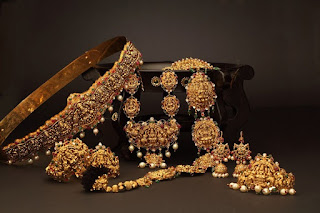The history of Indian jewellery spans over 5,000 to 8,000 years, showcasing a rich tapestry of cultural influences and artistic expressions. From the ancient times of the Ramayana and Mahabharata to the modern-day, Indian jewellery has undergone significant transformations, inspiring contemporary designers to create unique and intricate styles.
India is renowned for its ancient legacy of jewellery
crafting, which can be traced back to the Indus Valley Civilization (circa
2500-1500 BC). This civilization, located in present-day Pakistan and
northwestern India, produced remarkable jewellery pieces, including metallic
bangles, bead necklaces, and gold earrings. The affinity for ornamentation was
evident in the statues and artifacts of the time, reflecting a society that
valued beauty and craftsmanship.
The earliest forms of jewellery in India were
predominantly made from beads and natural materials. Prior to 2100 BC, beads
were the primary adornments, crafted using simple techniques that highlighted
the artisans’ creativity. As metallurgy advanced, gold and silver began to
dominate the jewellery landscape, leading to the creation of exquisite pieces
adorned with intricate designs and Persian motifs.
Throughout history, jewellery has been more than mere
decoration; it has served as a symbol of wealth, status, and cultural identity.
The diversity of styles across different regions and dynasties showcases the
rich traditions and artistic innovations that have influenced modern jewellery
design. For instance, the use of filigree work, enameling, and gemstone setting
can be traced back to ancient practices, now reimagined by contemporary
artisans.
Today, Indian jewellery continues to inspire designers
worldwide, blending traditional techniques with modern aesthetics. This
enduring legacy not only celebrates India’s rich cultural heritage but
also fosters a vibrant industry that thrives on creativity and craftsmanship,
ensuring that the art of jewellery making remains an integral part of Indian
culture.
















